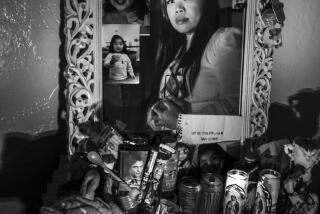Britain Considers Reining In School Bullies
- Share via
LONDON — Kelly Yeomans, a sweet-faced volunteer in a Salvation Army band, endured three years of teenagers’ taunts about her weight before taking a fatal overdose of painkillers last October. She was 13.
Darren Steele, a 15-year-old choirboy with “a heart of gold,” hanged himself in March after writing a three-page note that detailed two years of humiliations and threats by schoolmates.
Each year, at least 10 teenagers in England, Wales and Northern Ireland commit suicide because of bullying, a term that covers a wide range of verbal and physical abuse.
At least one of every four young people in the United Kingdom experiences some form of abuse while in school, says Kidscape, a children’s charity.
“Bullying is a pernicious terror that needs to be and can be stopped,” said Michele Elliott, Kidscape’s director. “The old idea of bullying as the normal steppingstone to development is shown to be nonsense.”
A recent Kidscape survey indicated that bullied children are nearly seven times as likely to attempt suicide as non-bullied children. Of 828 youngsters who were bullied while in school, 46% said they had contemplated suicide, compared to 7% of non-bullied children.
The link is pronounced enough for Britain’s Labor Party government to consider stepping in.
David Blunkett, the education and employment secretary, attacked the “scourge of bullying” at a recent Kidscape conference and spoke of tightening rules for student conduct, which currently are set on a school-by-school basis.
Schools also must provide more emotional support for bullied children, Blunkett said.
“People who feel friendless and whose self-esteem is damaged just need someone to stand by them, whether it is a teacher, a friend or a volunteer,” he said. “We all have to play a part.”
Karen, 34, knows that all too well. She was only 14 when she swallowed pills in an attempt to end four years of “hell” from being bullied.
“I just couldn’t see the light at the end of the tunnel,” she said in a telephone interview arranged by Kidscape. “The teachers didn’t want to know, and my parents just told me to pull myself together.”
Karen, who did not want her last name used, was a shy 11-year-old when a group of classmates at her all-girls school launched a campaign that began with teasing and light taps and escalated into assaults in empty classrooms.
Freedom came after she graduated at age 15, but the pain lingered long after.
“When I left school, I was a nervous wreck,” she said. “My self-esteem was shattered.”
Almost two decades later, she finally has managed to repair the damage, and even gotten stronger, Karen said. “But there are some people that just can’t get over it,” she said.
No matter what happens on an official level, Karen knows one thing: She will make sure her 7-year-old daughter never has to experience what she went through.
“I’ve told her: ‘Don’t let anyone touch you. Don’t let anyone bully you. Stand up for yourself, no matter how they scare you--because if you do, they’ll never bother you again.’ ”
More to Read
Sign up for Essential California
The most important California stories and recommendations in your inbox every morning.
You may occasionally receive promotional content from the Los Angeles Times.













